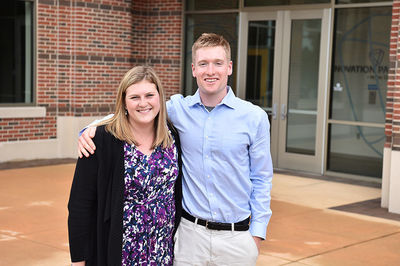 Holy Cross: Melissa Connolly and Thomas Cotter
Holy Cross: Melissa Connolly and Thomas Cotter
When College of the Holy Cross seniors Thomas Cotter and Melissa Connolly learned they were both accepted into ESTEEM, they met – for the first time – at Cool Beans coffee shop on the 2,900-student campus in Worcester, Mass. He was an economic major who had become fluent in Spanish and gained a passion for data analysis; she was a biology major with a concentration in biochemistry who had conducted undergraduate research on a new cell growth surface for in vitro cultures. The second time they met, she had a spreadsheet of places where they could live in South Bend.
“We both recognize the value of ESTEEM,” Cotter says. “We’re super-excited about it and have become great friends through the program. We all bring such different backgrounds, different disciplines, different universities.”
Connolly and Cotter say the small liberal arts college equipped them with critical thinking and problem-solving skills that help them thrive in ESTEEM.
“I think it honed my capacity to critically think and critically problem-solve,” Cotter says. “It gave me the foundation of my analytical confidence. I learned how to make my arguments and my hypotheses more quantitatively and data-driven.”
He’s applying that in his capstone with the global IT consulting firm Avanade, scaling their managed analytics platform and pursuing his undergraduate interest in data analytics and statistical analysis. “It’s not being fully taken advantage of,” he says. “Over the next 10 to 15 years, it’ll become a necessary business component. I want to be part of that shift. I want to be able to understand it on a technical level and how those calculations are being done but also in a broader microbusiness sense of how we’re going to use it.”
“I definitely think the liberal arts education provided me with a sort of flexibility and adaptability in any academic situation,” Connolly says. “That also helps me working with people in groups that have totally different backgrounds than me and being able to communicate with people of different expertise.”
Connolly is leveraging her science major for her capstone project, conducting market research and customer validation to develop a business plan for a test kit that predicts the value of breast cancer immunotherapy for individual patients, based on the research of Professor Siyuan Zhang at Notre Dame’s Harper Cancer Research Institute. “It’s really cool being able to work on the commercialization and the de-risking of that,” she says. “Before, I was just doing pure science.” Connolly is helping launch a startup to help low-income people connect with available primary medical care facilities in South Bend to avoid emergency room visits for ordinary treatments.
ESTEEM opens vast opportunities for enhancing their skill sets.
“What drove me to ESTEEM was the capacity to continue pushing my technical skills and also the fact that it is applied,” Cotter says. “ESTEEM takes the critical thinking and creative problem-solving, the technical skills and the analytical skills we developed through our undergrad and our multidisciplinary majors and allows us to apply it in a team environment that is a lot less academic than the experience we had in our undergrad. For me, what ESTEEM has done is cement my confidence to tackle wide-ranging problems, both on an individual scale and as a member of a team, which are the real-world issues we face as entrepreneurs in the business world.”
Connolly, who had decided against both medical school and the Ph.D. route was seeking something to employ her critical thinking and problem-solving skills. “How can I align this technical background I have with my desire to solve problems?” she says. “That’s when I heard about the ESTEEM Program. Almost instantly, I knew this was something I wanted to do to improve my innovative skill set and explore the world of business.”
Access to CEOs, industry leaders, venture capitalists, and recruiters adds a valuable dimension to the ESTEEM experience, she adds: “That’s something that never would have happened at my small liberal arts undergraduate school. “I’m trying to soak up and learn as much as I can from it. We have all these crazy opportunities that are crammed into one year that we would never get otherwise.”